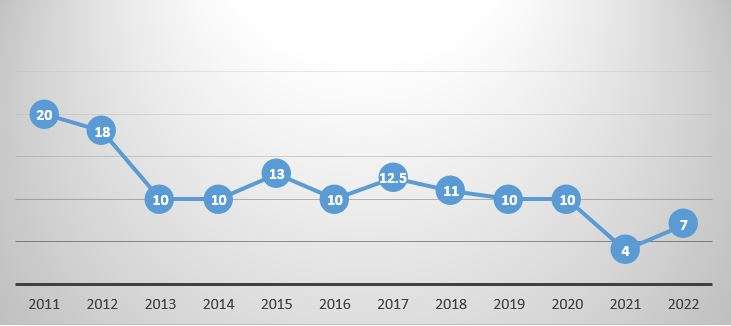Government and labor unions always disagree to agree when it comes to negotiations for pay increments, one party always seem to have the upper hand at one point in time in the negotiation process. For this year, it seems the government had the better of the labour unions with regards to its negotiation prowess.
On June 1, 2021, the PSJSNC agreed on a 4 percentage point rise in the base pay of all public service workers in 2021 and a 7% rise in 2022. This is the lowest pay rise since the Fair Wages and Salaries Commission (FWSC) begun its Public Services Joint Standing Negotiation Committee (PSJSNC) negotiations in 2010.
Base pay increments in the past decade (%)

Source: FWSC
Meanwhile, Organized Labor entered the negotiations with high hopes with a proposal of a 15% increment in the base pay in 2021 and 2022. However, the government expressed its unwillingness to honor this proposal, citing the need to fight the current pandemic, which has already limited the fiscal space of the government, as its main constraint. Also, the government indicated that it may be forced to lay off some workers if it agrees with the proposed 15% increment.
Upon several engagements, Organized Labour revised their demands downwards to 10% for both years whilst government insisted on 4% and 6% respectively for 2021 and 2022.
Displeasure of labour unions
However, just after the announcement of the 4% increment, members of the various labour unions have expressed their dissatisfaction, describing it as “unacceptable”, also citing the current economic conditions as a reason.
For the first time, the four unions in the education sector, the Ghana National Association of Teachers (GNAT), the National Association of Graduate Teachers (NAGRAT), Coalition of Concern Teachers (CCT) and the Teachers and Educational Workers Union (TEWU) have issued a statement asking the government to reverse its decision of a 4% increment without payment of arrears.
It is very interesting how both parties are citing the same issue but from different perspectives to back their demands. Nevertheless, it is worth acknowledging that the devastating effects of the pandemic on lives and livelihoods call for the need for employees to meet the wage demands of their workers.
However, just like businesses, the pandemic has had an equally significant toll on government resources. As a result, the government stated clearly that it was not in the position to increase wages by a substantial margin in the medium term just after the budget was presented in the floor of Parliament in March this year.
“If you look at the budget, COVID-19 is not expected to abate until the end of 2023 and we are all looking to be tightening our belts for a while and people should not be expecting huge wage increases in the course of the next few years. This is because we don’t have money to pay”, said Dr. Nii Noi Ashong, Technical Advisor for the Finance Ministry on Wednesday 24th March, 2021.
Rising government expenditure
Already, government spent GH¢7,351.9 million on compensation of employees, comprising wages and salaries and social security contributions in the first quarter of the year, according to data from the Bank of Ghana. This accounted for 57% of the government’s total revenues including grant of GH¢12,847.9 million in Q1 2021.
Moreover, government expenditures are still on the high side due to the need to cater for unbudgeted COVID-19-related expenditures. Data from the Bank of Ghana show that COVID-19-related expenditures exceeded the target of GH¢271.4 million by 156.1 percent in the first quarter of the year.
Whilst the concerns of Organized labour were genuine, it is also very important for the unions to consider the millions of Ghanaians who are not privileged to be gainfully employed who may benefit from these funds the government should have given to just a few. Looking at it from this angle, the decision by Organized labour to accept the government’s proposal may be justified, and probably described as sacrificial.
It is therefore, unacceptable for any person to describe the negotiation skills of Organized Labour as weak. Whilst many may not see this as a win-win game, it could probably allow the government to channel these resources to other important areas which may be of benefit to members of the various unions in the long run.























